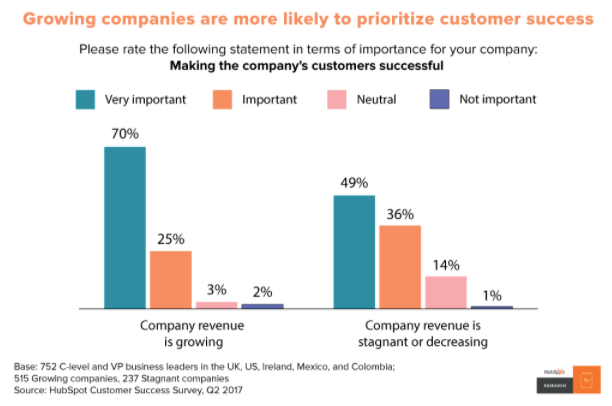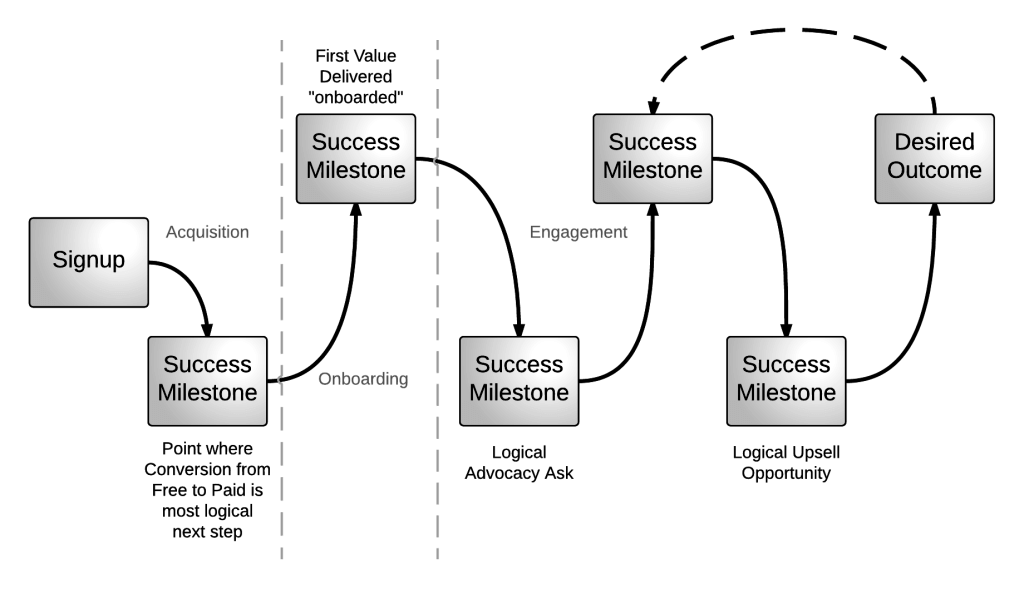Account Expansion: What It Is, Why It’s Important, and How to Ensure it
The secret to jet-powered business growth is account expansion. By retaining existing customers and increasing the revenue growth they provide, companies can boost their profits for less cost and effort than finding new customers.
This guide explains exactly what account expansion is and why it’s vital for your business. It also digs into the best practices and exact strategies for making it happen. By the end, you’ll have a time-tested process for helping your customers succeed and achieve their next goal with additional products or services. Hence increasing your customer lifetime value.
Keeping reading or jump ahead to these sections:
- What is Account Expansion?
- Account Expansion Best Practices
- 3 Steps for Account Expansion
- Final Takeaway: Great Customers Drive Account Expansion
What is Account Expansion?
Account expansion refers to growing the revenue generated by existing accounts. Account managers do this by upselling or cross-selling additional products to a current customer. This allows the company to increase its earnings without necessarily needing to acquire new business.
Time and time again, research proves retaining and selling to current accounts provides a higher return on investment (ROI) than acquiring new customers. According to ProfitWell, customer acquisition costs (CAC) have increased by 50% over the past five years. Therefore, it’s essential that account managers work to provide excellent customer satisfaction and ensure customer needs are met to avoid churn or the loss of customers over time.
Then there’s the fact that the probability of selling to a current customer is 60% to 70%, while the likelihood of selling to a new prospect is only 5% to 20%. Not only does it cost less to retain existing accounts, but current clients also generate more revenue. In fact, research from Bain & Company indicates that increasing customer retention rates by 5% can grow earnings by 25% to 95%.
Account Expansion Best Practices
Selling to current customers offers massive ROI and business growth potential, but expansion probably isn’t the right fit for every client. You better need to understand customer before you invest into your account expansion efforts. However to increase your account expansion opportunities, include these three best practices:
-
Find the Right Clients
Not every new customer is a win especially for the SaaS companies. If your sales team is hustling to get anybody and everybody to sign up for your SaaS, chances are they’re signing new clients who are destined to churn. This is an expensive mistake.
The reality is your solution isn’t right for everyone. A discerning sales strategy recognizes this and prioritizes prospects who are a proven fit. This ensures you’re spending money acquiring customers with great lifetime value (LTV).
-
Prioritize Client Success
Client success, also known as customer success, is when an account achieves the desired outcome by using your product or service. For them, this is the most important result of your partnership. It also guarantees a healthy customer retention rate, thus increasing your revenue.
Customer loyalty is closely tied to business growth. According to a survey of 752 companies by HubSpot, businesses experiencing revenue increases are 21% percent more likely than their stagnant counterparts to view client success as “very important.”

This might be because successful customers not only stick with the company but are more likely to make additional, recurring purchases, and also are open to refer your business to other customers as well. Hence power of customer engagement is undeniable and you could only expect that if you prioritize your customers success as yours.
-
Have a Team Dedicated to Customer Success
Resist the temptation to have salespeople offer upsells and cross-sells to your existing customers. They often don’t have the full picture of how these clients are engaging with the company or understand what will best contribute to their success.
Instead, create a team of customer success managers (CSMs) who are responsible for helping clients get to their next benchmark. Unlike customer support reps—people who respond to roadblocks or challenges the client is facing with your product—CSMs anticipate problems using customer data and offer solutions that can help the customer wins.
Customer Success Teams pots you in a good position to manage account expansion by identifying problems in your existing customer base. However, forcing your Customer Success Teams to upsell or cross-sell to existing clients creates a conflict of interest. The pressure to fulfill a quota can lead Customer Success Managers to push customers into new products or services that don’t increase their success.
-
Only Sell if It’s Logical
While it’s tempting to think of fulfilling quotas as the ultimate goal, CSMs must remember the customer doesn’t care about a company’s revenue. Upselling or cross-selling for the sake of meeting a benchmark at the expense of the customer’s success will only harm the business in the long-term.
Clients who feel they’ve been sold something that doesn’t actually help them reach their next milestone will likely forgo a contract renewal. Therefore a dent in the account expansion rate. Thus, a CSMs should only offer an additional product or service if they genuinely believe it will help the client reach their goals.
On the upside, CSMs who are sure an expansion will increase a customer’s success will have an easier time making the sale. Their conviction that it’s the right move avoids the awkwardness they’d otherwise feel when pushing a poor solution for the purpose of hitting a quota.
-
Pay Commissions Based on Customer Success
Consider doing away with quotas for CSMs altogether. This way, they can prioritize customer success without feeling pressured by a competing influence. Thus, adding a commission structure for your CSMs can be one of the account expansion strategies.
Commissions based on customer success are a powerful alternative. CSMs who are rewarded for sales that lead to the client’s next milestone are more likely to invest time into carefully identifying the best upsell and cross-sell candidates. They also won’t waste any effort selling to customers who wouldn’t benefit from an additional product.
3 Steps for Account Expansion
1. Create a Post-onboarding Customer Journey
A client’s experience with your company doesn’t end when they make their first purchase. After they start using your product, they should hit multiple milestones that demonstrate the value of doing business with you, as described in this chart from Sixteen Ventures:

A CSM helps facilitate this journey. Here’s how the process might play out:
- During the first quarterly business review (QBR), the CSM assesses whether the client hit their first post-onboarding milestone. Depending on the customer feedback, they may also work with the customer to set their next benchmark. This doubles as a good opportunity to ask for a review or referral.
- At the second QBR, the CSM checks for the continued success of the client. They might provide support or advice about how to get more out of the customer’s current product. Another milestone is set for the future.
- During the third QBR, the CSM assesses how satisfied the customer is and what ROI they get from using the product. If the CSM believes an additional product or service will help the client reach the next level of success, they can proceed with pitching an upsell or cross-sell.
In an ideal world, a QBR would be a high touch meeting with each account. However, finite time and resources likely make this impossible. Instead, consider sending each customer a survey, email, or making a phone call to review their milestone and make a plan for the next step. This not only takes less effort and resources for your company but it also helps you keep the customer relationship in check.
2. Review Milestones After Expansion
After a successful expansion, the client and CSM should assess whether or not the added product helped the customer reach their desired milestone. This process can happen during the QBR, following the new purchase.
Reviewing the effectiveness of expansion shows the client their happiness comes before your profit, which helps build trust and loyalty to the company. It also reduces the likelihood they’ll feel exploited, and as a result, choose not to renew their contract.
Finally, the review session dissuades CSMs from making a sale for the wrong reasons, since this step determines whether they receive their commission.
3. Optimize the Account Expansion Process
CSMs and their supervisors should constantly be looking for opportunities to improve the customer’s journey. With each QBR, search for trends and adjust the client’s success process as needed.
For example, analyze accounts that have already undergone expansion. What do they have in common? Are there any traits that might indicate a customer is a good candidate for upselling or cross-selling? Isolate these characteristics and train CSMs to notice and act on them.
Next, take a look at instances where accounts expanded, then retracted, or weren’t retained. Was a solution offered when it shouldn’t have been? How can CSMs recognize and avoid making similar mistakes in the future?
By reflecting on what’s working and what’s not, you can better ensure client success and increased revenue.
Final Takeaway: Great Customers Drive Account Expansion
Client success is a powerful factor in account expansion. When customers experience firsthand the value your solution provides, they’re more likely to invest in additional products that will help them reach the next milestone.
To do that, however, you need to find prospects who are likely to get great results from your product. Lead intelligence software makes your search for those ideal clients more effective and automated.
That’s where LeadBoxer comes in. LeadBoxer gathers data about prospects, even site visitors who would otherwise remain anonymous. It then assigns a lead score, or a number describing how likely they are to convert, based on the criteria you set.
LeadBoxer offers a foolproof process for finding customers primed for success. Start your free trial today.
Account Expansion: What It Is, Why It’s Important, and How to Ensure it Read More »
